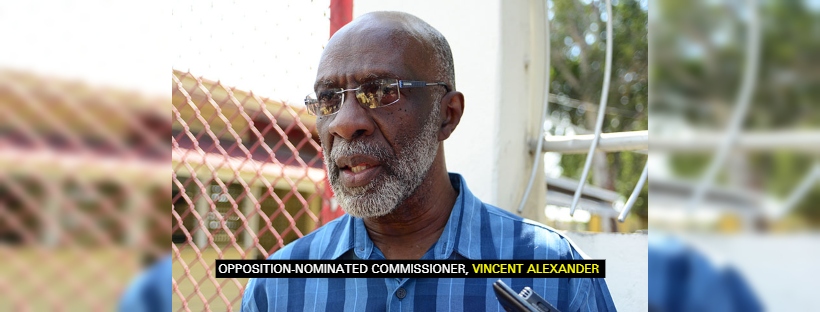Commissioner of the Guyana Elections Commission (GECOM), Vincent Alexander on Sunday accused the PPP/C Government of weakening the legs of democracy. In so doing, Alexander contends that “legal impediments” are being removed so that the ruling party can move voters to opposition strong-holds, thereby manipulating electoral results.
Alexander outlined the foregoing perspective during an interview on Nation Watch. During that episode, he and the show’s moderator, Mervyn Williams, reflected on a case filed in the High Court by People’s National Congress Reform (PNCR) member, Carol Smith-Joseph.
Smith-Joseph had filed a court case in December 2024 to repeal the amendments made in 2022 to the National Registration Act (NRA) which removed the requirement of residency for citizens to vote.
The PNC/R Member told the court through her lawyers, Dexter Todd and Dexter Smartt, verification of the addresses of registrants was indeed necessary since there are instances of addresses being barren or housing abandoned buildings. The applicant also contended that there are instances where persons have offered generic addresses.
Respondent in the case, Attorney General, Anil Nandlall S.C, has argued that the amendments to the NRA simply bring the law into conformity and subservience to the Constitution which only requires one to be a Guyanese and 18 years or older to vote. With the ruling pending on April 3, 2025, Alexander and the Nation Watch host weighed in on the case and the strength of the arguments made therein.
Alexander said, “Carl Joseph has gone to the court to complain that this amendment breaches the requirements of our electoral system, in terms of Local Government Elections, which specifies that a person must be known to reside in a particular place to be registered.
“The way in which this is done is to verify the person’s place of residence by confirming that the person does, in fact, reside there. This provision is also applicable to regional elections, and it is contended, should be applicable to constituency elections.”
He added, “What Carol Joseph is arguing is that by removing the requirement for someone to be verified at their place of residence, it effectively allows someone who may not be a resident, to be registered in a place where he or she does not reside, and consequently to vote in an election, particularly a local election.”
Alexander said his contention is not that the person should not vote, but rather, that they should not vote in a place where they are not a resident. The GECOM Commissioner said this state of affairs has given the PPP considerable latitude for manipulation of the electoral process so that they can have more votes in an area that is not their stronghold.
“We have witnessed in Local Government Elections that what the PPP has done is, where they have a local authority that undoubtedly they would win historically, they would often take voters from that local authority into an adjacent or another local authority to register, even though those voters do not live in that other locality. When they go to register, they give an address,” said Alexander.
He added, “What this (amended) law is seeking to do is remove the impediment that existed previously, which required them to physically identify with the place. So they register, and then they go and vote. What this vote is doing is manipulating the voters’ list to give the PPP a majority in the area where they would not normally have a majority.”
Alexander said this occurred in the 2018 Local Government Elections where the PPP won the Buxton/Foulis Neighbourhood Democratic Council (NDC).
Overall, Alexander said the mischief afoot is clear–to dismantle the legal architecture that supports the nation’s democratic system.
The GECOM Commissioner said democracy has three pillars: representation, responsiveness, and responsibility. He posited that representation is the one currently being dismantled. As for responsiveness, he said this too is not respected, adding that the government is unresponsive to the population when they encounter problems.
As for responsibility, he said this refers to transparency, “not merely in the sense of visibility, but in the equal application of the law to everyone.” In Guyana, Alexander said there is a lack of equal application of the law across a range of issues. Consequently, “the legs of democracy do not, in fact, exist in totality.”













